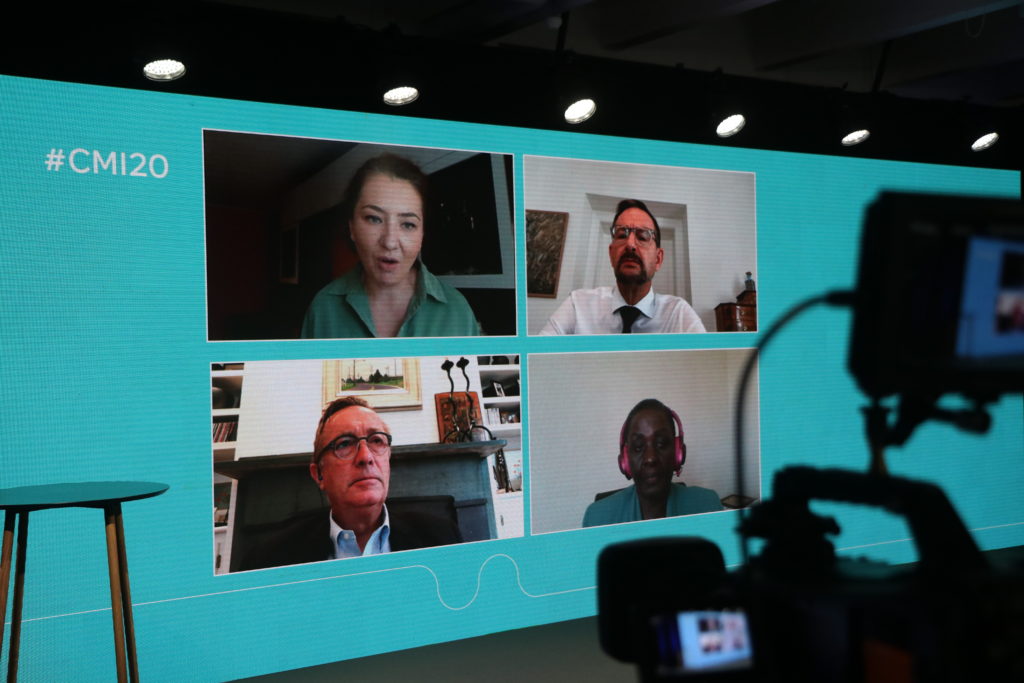CMI’s work continued successfully in 2020 – here are three achievements
2020 is near an end and it’s now time to look back at this year’s work. Despite the Covid-19 pandemic, CMI has managed to continue its work to prevent and resolve violent conflicts. Here we focus on three key achievements of the past year.

Behind the scenes of CMI’s 20th anniversary webinar held in September. CMI’s Head of Eurasia team Roxana Cristescu discussing with Ambassador Jeffrey Feltman, Ambassador Thomas Greminger and Dr Speciosa Wandira Kazibwe.
The past year has been strange and burdensome in many ways. CMI’s year started with the sad news of the passing of our Executive Director Tuija Talvitie, and only few months later the global pandemic started causing unforeseen turmoil around the world. But 2020 also marked an important milestone for CMI, with the 20th anniversary of the foundation of CMI by President Martti Ahtisaari.
Despite all the obstacles, CMI’s work for conflict resolution and peace mediation has continued unabated. All CMI’s 27 projects around the world have promoted the vision of our founder President Martti Ahtisaari that all conflicts can be resolved. We have managed to carry out our work successfully.
Agility
When the global pandemic started, CMI staff and our local partners in the field adapted rapidly to the new situation. Our experts adjusted their plans, put new approaches and tools to use, and continued with their work.
Local actors are on the frontline of the crises in places where governments are overwhelmed or simply unable to provide the necessary information and care. This has been the case with Covid-19 too. When the health crisis this year started, some of the dialogue groups supported by CMI were harnessed to local Covid-19 activities.
In Libya, the Libyan Women’s Union raised awareness about Covid-19 around the country, and in Palestine CMI and its partner Masarat organised dialogues and workshops on the expected short and long-term impacts of the Covid-19 pandemic in the West Bank and the Gaza Strip. Based on these discussions, the Palestine team will soon be publishing a policy brief consisting of seven papers written by Palestinian experts focusing on the contemporary political dynamics in Palestine.
Participation
CMI’s work is about bringing people together, but at the start of the pandemic this seemed an almost impossible task. But the virtual platforms and channels used have actually made it easier for some people to attend CMI’s meetings and events. In fact, this year we have managed to reach more people than previously. For building lasting trust, face-to-face meetings are still very much needed, but virtual platforms give our work an additional channel to reach people globally.
Virtual events do not require the same logistical arrangements as live events, which also makes it easier to ensure accessibility. For example, CMI has supported events and workshops organised by the African Union by ensuring that all participants have the necessary data to access virtual platforms. Not everyone can access internet data, but the data packages provided by CMI have ensured that participants could attend the meetings.
Peacetech
Technology shapes the nature of war, but it can be also used to improve peace mediation practices and processes. Technologies in peace mediation, in other words peacetech, provide many opportunities that have not yet been fully investigated in peacemaking.
CMI has probed the use of technologies in peace mediation for some time, but this year we truly invested in this by starting our own project on peacetech. We explored the potential of virtual reality for peace mediation and in 2021 we will continue our work with the aim of providing concrete peacemaking tools.